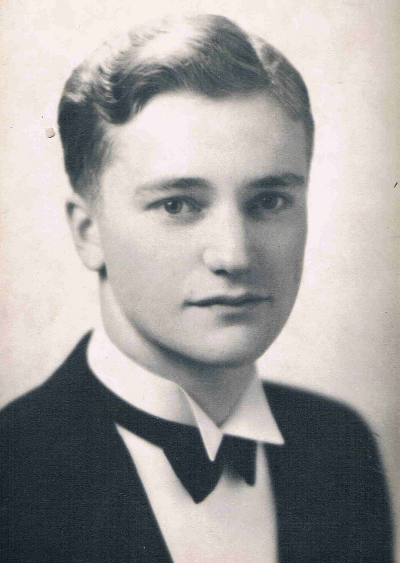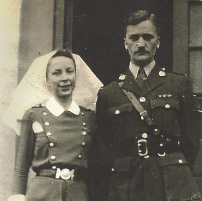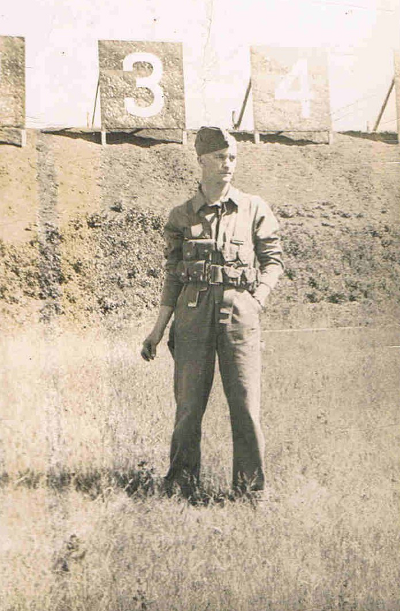Major Edward Grieg Styffe
Children and Youth
Eddie was the fourth child of Oscar and Ragna, born in 1917 in Port Arthur, where he spent his childhood and youth. He worked with his father as a salesman and purchaser of wood pulp, one year before going off to university. He knew French and some German and Norwegian quite well. He loved skiing in the winter and summer swims in the lake trout with his brother and a friend in the summer time. He was a man full of spirit and humor, he played mandolin and the ukulele, and he liked to sing and make music.
Commitment
As Canada declared war on Germany on 12 September 1939, Edward undertook June 5, 1940, shortly before the capitulation of Norway. In 1943, he spent three months in Tunisia with the English army of Montgomery. He then joined the newly equipped Lake Superior Regiment to support motorized armor, where he commanded C Company, of which many men come to his hometown and its surroundings. The regiment was based in southern England, where he met a nurse. She volunteered at the Canadian hospital next door. Mary Trenaman, like him, had a family established in Canada, but also with Norwegian ancestors. They married in April 1944, they then both 26 years old.
The confrontation
Edward went to France on July 27. His regiment was part of the 4th Armored Division. The Canadian Division left England to win the Normandy front. The Regiment of Lake Superior was the vanguard of this Division towards Cintheaux on August 8. Major Styffe’s company took part in the attack against the German positions in Bretteville-le-Rabet, where his friend Lt. Archie Bell was injured. After the failure of the Canadians to the woods of Quesnay was prepared Operation Tractable for August 14th.
The last letter from Major Styffe to his wife shows that he knows that the battle of Normandy will be decisive for the Allied advance in the north of France: “We are about to leave for a very important battle, it could help end the war quickly”.
A portrait of Edward Styffe by Mary Agnew
Mary Agnew, the wife of Major Edward Grieg Styffe from April to August 1944, we trace a portrait of her husband:
«You asked about other memories of Eddie, as I knew him in 1944. His father had died shortly before I made his acquaintance in 1943. He loved her dearly and was deeply affected. They had particularly warm relations. His father also loved music and that’s why he had given Eddie the name of the great Norwegian composer Edvard Grieg. It was not easy for Eddie to bear the name of a character so important. He laughed a little and shrugged his shoulders. It was a good athlete, he played hockey as a teenager and had lost a tooth (which was replaced), playing tennis on the court of our hospital. He loved drawing and painting when he was younger, had talent although he has never taken a course. He had perfect pitch and was easily the accompaniment of any theme that I sang. He also had a very good sense of rhythm, it was a pleasure to dance with him. He assembled and directed a comedy, or rather a satire, with the officers of his unit shortly before they left France.»
Friends of Major Styffe
Maj. Donald Johnson, a former regimental comrade of Major Edward Styffe, talks about his pleasure to sing in chorus:
«Eddie loved to sing. One year he organized a choir for Christmas and insisted I do the musical arrangements and he had guaranteed that the singers are all frequent repeats. Most of the officers was one and it was a success.»
«Eddie loved to sing. One one occasion ET Organized a Christmas choir, insisting That I arrange the music and He Would Guarantee attendance at all rehersals. It consisted of officers and MOST of the WAS well Received.»
Sources:
Mary Agnew, fax dated April 20, 2001 Major Styffe the committee
Major Donald Johnson, e-mail of 30 March 2001 addressed to John Styffe in response to questions from the committee Styffe Major
~~~
En Français:
Edward Styffe: un Canadien solidaire des Européens
L’enfance et la jeunesse
Quatrième enfant d’Oscar et de Ragna, il est né en 1917 à Port-Arthur, où il passe son enfance et sa jeunesse ; puis il travaille avec son père comme vendeur et acheteur de pulpe de bois, avant de passer une année à l’université. Il connaît assez bien le français et un peu l’allemand et le norvégien. Il sait skier et aime nager l’été dans le lac des Truites avec son frère et un ami. C’est un homme plein d’entrain et d’humour, il joue de la mandoline et du ukulélé, il aime chanter et faire de la musique en groupe.
L’engagement
Le Canada a déclaré la guerre à l’Allemagne dès le 12 septembre 1939, Edward s’est engagé le 5 juin 1940, peu avant la capitulation de la Norvège. En 1943, il passe trois mois en Tunisie avec l’armée anglaise de Montgomery. Ensuite il rejoint le Lac Supérieur, régiment d’infanterie motorisée nouvellement équipé pour appuyer les blindés, où il commande la compagnie C, dont beaucoup d’hommes viennent de sa ville natale et de ses environs. Ce régiment est basé dans le sud de l’Angleterre. C’est là qu’il rencontre une infirmière, elle aussi volontaire de l’hôpital canadien voisin, Mary Trenaman, de l’Ontario comme lui, d’une famille anciennement établie au Canada, mais avec également des ancêtres norvégiens, et d’autres, plus lointains, normands. Ils se marient en avril 1944, ils ont alors tous deux 26 ans.
L’affrontement
Edward part en France le 27 juillet. Son régiment appartient à la 4ème division blindée, dernière division canadienne à quitter l’Angleterre et à gagner le front de Normandie. Le régiment du Lac Supérieur constitue l’avant-garde de cette division en direction de Cintheaux le 8 août ; puis la compagnie C du major Styffe participe à l’attaque contre les positions allemandes à Bretteville-le-Rabet, où est blessé son ami le lieutenant Archie Bell. Après l’échec des Canadiens devant le bois du Quesnay est préparée l’opération Tractable pour le 14 août.
La dernière lettre du major Styffe à sa jeune femme montre qu’il sait que cette bataille du Normandie sera décisive pour la progression des Alliés dans le nord de la France : «Nous sommes sur le point de partir pour une bataille très importante, elle pourrait permettre de terminer la guerre rapidement.»
Portrait d’Edward Styffe par Mary Agnew
Mary Agnew, épouse du major Edward Grieg Styffe d’avril à août 1944, nous trace un portrait de son mari:
«Vous m’avez demandé d’autres souvenirs à propos d’Eddie, tel que je l’ai connu en 1944. Son père était mort peu de temps avant que je fasse sa connaissance en 1943. Il l’aimait tendrement et en fut profondément affecté. Ils avaient des rapports particulièrement chaleureux. Son père aimait aussi la musique et c’est pourquoi il avait donné à Eddie le nom du grand compositeur norvégien Edvard Grieg. Ce n’était pas facile pour Eddie de porter le nom d’un personnage si important. Il en riait un peu et haussait les épaules. C’était un bon sportif, il jouait au hockey quand il était adolescent et y avait perdu une dent (qui avait été remplacée) ; jouait au tennis sur le court de notre hôpital. Il aimait dessiner et peindre quand il était plus jeune; avait du talent bien qu’il n’ait jamais suivi de cours. Il avait une oreille parfaite et trouvait facilement l’accompagnement de n’importe quel thème que je lui chantais. Il avait également un très bon sens du rythme, c’était un plaisir de danser avec lui. Il avait monté et mis en scène une comédie, ou plutôt une satire, avec les officiers de son unité peu avant qu’ils ne partent en France.»
Texte original : «You have asked for some memories of Eddie as I knew him in 1944. His father died shortly before I met him in 1943. He loved him dearly and was very saddened. They had an especially warm relationship. He also loved music, and so named Eddie after the great Norwegian composer Edvard Grieg. Eddie didn’t feel comfortable to be named after such an important person. He would laugh a bit and shrugh his shoulders. He was very athletic, played hockey as a youth, and had a tooth knocked out (but it was replaced). Played tennis at our hospital court. He liked to draw and paint when he was younger. Had talent, but no professional teaching. He had a perfect musical ear and would easily find harmony to any theme that I sang. Also had a very good sense of rhythm, made him a delight to danse with. He organized and produce a comedy play or ‘skit’ with the officers of his unit shortly before they left to France.»
La chorale du major Styffe
Le major Donald Johnson, ancien camarade de régiment du major Edward Styffe, nous parle de son plaisir à chanter en chœur:
«Eddie adorait chanter. Une année il organisa une chorale pour Noël en insistant pour que je fasse les arrangements musicaux et il m’avait garanti que les choristes seraient assidus à toutes les répétitions. La plupart des officiers en faisait partie et ce fut un succès.»
«Eddie loved to sing. On one occasion he organized a Christmas choir, insisting that I arrange the music and he would guarantee attendance at all rehersals. It consisted of most of the officers and was well received.»
Source:
Mary Agnew, télécopie du 20 avril 2001 au comité Major Styffe.
Major Donald Johnson, e-mail du 30 mars 2001 adressé à John Styffe en réponse aux questions du comité Major Styffe.



